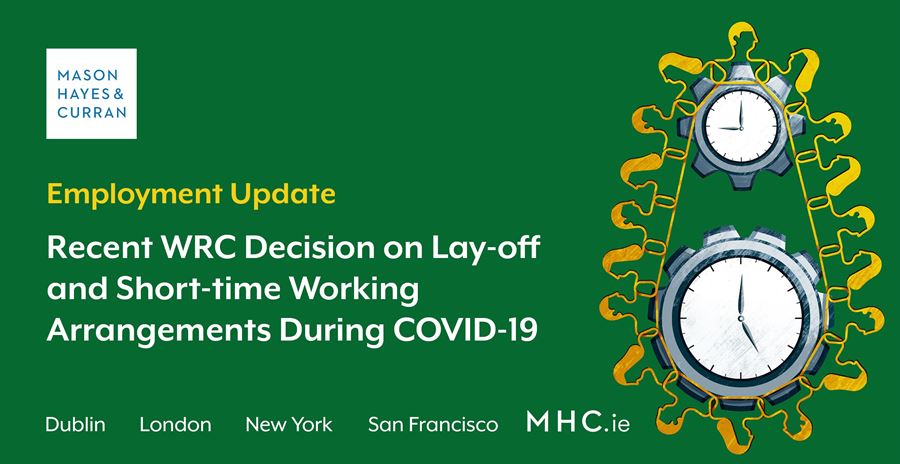Recent WRC Decision on Lay-off and Short-time Working Arrangements During COVID-19

One of our employment team’s most frequently asked questions following the announcement of a national lockdown in March 2020, was whether employers could unilaterally place employees on unpaid lay-off or short-time without contractual authority to do so. The WRC has recently issued a decision on this point.
Background
In March 2020, the employer’s business was severely impacted due to COVID-19. The employer introduced a range of measures in response to the deteriorating situation including temporary unpaid lay-off or short-time or, where possible, an option for employees to take annual leave or unpaid leave days on a temporary basis.
The employer attempted to engage with the employee to try to agree alternative arrangements in relation to his hours of work on a temporary basis, with a view to ensuring business continuity.
Somewhat unusually, before commencing employment in 2018, the employee had requested, and the employer agreed, to remove the lay-off/short-time clause from his contract.
The employee refused the proposed shortened working arrangements put forward by the employer. The employee instead offered to move to a four-day week for the month of April 2020. The employer advised the employee that there was not enough work for either a full-time or four-day week. The employer also stated that it had no option but to implement short-time working on a temporary basis. The employer proceeded to implement the shortened working hours, and pay, without the employee’s agreement.
The employee’s normal hours and pay were ultimately restored in September 2020. In the meantime, the employee lodged a complaint with the WRC under the Payment of Wages Act 1991 (the 1991 Act).
The employer submitted that there is a custom and practice in Ireland, and particularly in the context of COVID-19, that periods of temporary lay-off and short-time working are without pay. Where such a custom and practice exists, this forms part of the employee's terms and conditions of employment, as an implied term.
Decision
The WRC considered the negotiations which took place between the parties before the employment contract was signed. It held that the removal of the lay-off / short-time clause could only reasonably be interpreted as an agreement that the employer could not unilaterally impose a lay-off or short-time on the complainant. Therefore, this would supersede any implied term by custom and practice that might otherwise have existed.
As the deduction was not a statutory deduction, was made without the employee’s consent and did not relate to any term within his contract of employment, the WRC held that the deduction was unlawful under the 1991 Act.
Conclusion
This case is somewhat unique in that the employer and employee had specifically negotiated the removal of the lay-off/short-time clause before the employment contract was signed. We are aware of several similar yet-to-be-heard complaints where no such prior negotiations took place. It will be interesting to see how the WRC approaches those cases.
For employment law advice and representation, contact a member of our Employment & Benefits team.
The content of this article is provided for information purposes only and does not constitute legal or other advice.
Share this:




